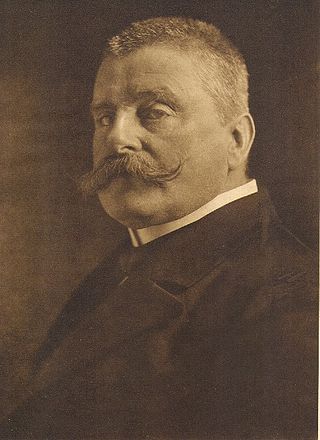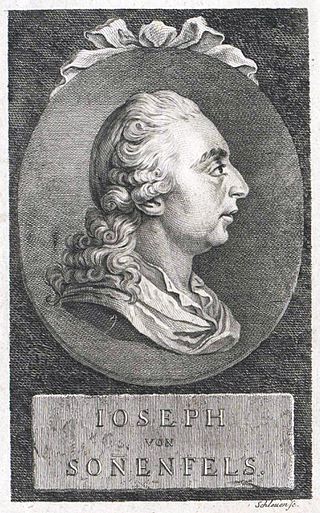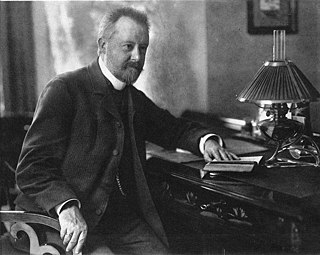Related Research Articles

Wilhelm Carl Josef Cuno was a German businessman and politician who was the chancellor of Germany from 1922 to 1923, for a total of 264 days. His tenure included the episode known as the Occupation of the Ruhr by French and Belgian troops and the period in which inflation in Germany accelerated notably, heading towards hyperinflation. Cuno was also general director of the Hapag shipping company.

Adam Stegerwald was a German Catholic politician and a leader of the left wing of the Centre Party.

Baron Detlev von Liliencron born Friedrich Adolf Axel von Liliencron was a German poet and novelist from Kiel.
Reinhold Maier was a German politician and the leader of the FDP from 1957–1960. From 1946 to 1952 he was Minister President of Württemberg-Baden and then the 1st Minister President of the new state of Baden-Württemberg until 1953.

Joseph Freiherr von Sonnenfels was an Austrian and German jurist and novelist. He was among the leaders of the Illuminati movement in Austria, and a close friend and patron of Mozart. He is also the dedicatee of Ludwig van Beethoven's Piano Sonata No. 15, Op. 28, which was published in 1801.

Max Julius Friedrich Brauer was a German politician of the Social Democratic Party (SPD) and the first elected First Mayor of Hamburg after World War II.
Carl Wirths was a German politician of the Free Democratic Party (FDP). He was a representative of the Landtag of North Rhine-Westphalia from October 2, 1946 until September 1, 1949 and the national Bundestag from 1949 until his death.

Gustav Falke was a German writer.

The German Party was a national-conservative political party in West Germany active during the post-war years. The party's ideology appealed to sentiments of German nationalism and nostalgia for the German Empire.

Margarete Gröwel was a German teacher who became a politician. Later, in 1953, she became the first woman to serve in the German consular service in Houston.
A war of annihilation or war of extermination is a type of war in which the goal is the complete annihilation of a state, a people or an ethnic minority through genocide or through the destruction of their livelihood. The goal can be outward-directed or inward, against elements of one's own population. The goal is not like other types of warfare, the recognition of limited political goals, such as recognition of a legal status, control of disputed territory, or the total military defeat of an enemy state.

Wolfgang Händler was a German mathematician, pioneering computer scientist and professor at Leibniz University Hannover and University of Erlangen–Nuremberg known for his work on automata theory, parallel computing, artificial intelligence, man-machine interfaces and computer graphics.
Reinhold Hammerstein was a German musicologist.
Hans-Christof Kraus is a German historian.

Johann Friedrich Ahlfeld was a German Lutheran theologian and preacher.

Hermann Uhde-Bernays was a German German studies scholar and art historian.
Georg Ludwig Kinsky was a German musicologist.
Franz Heitgres was a German politician (KPD) and Senator in Hamburg.

August-Martin Euler was a German politician. He was state chairman of the FDP in Hesse from 1947 to 1956, a member of the German Bundestag from 1949 to 1958, and chairman of the FDP parliamentary group there from 1951 to 1952. In 1956, he led a breakaway from the FDP faction, the so-called Euler Group.
References
- ↑ Christof Brauers: Die FDP in Hamburg 1945 bis 1953, S. 276.
- ↑ Christof Brauers: Die FDP in Hamburg 1945 bis 1953, S. 405.
- ↑ "The London Gazette, Issue 40032, Page 6535" (PDF). The London Gazette.
- ↑ "Hartenfels, Ludwig | ZBW Press Archives". pm20.zbw.eu. Retrieved 2023-11-24.
- ↑ Zitat aus dem Austrittsschreiben, das im Archiv des Liberalismus (Gummersbach), FDP-LV Hamburg, 30391/3, vorliegt: „In Hessen, NRW geht die F.D.P. zusammen mit Militaristen und wirbt im Zeichen von schwarz-weiss-rot demagogisch um Menschen, die nicht zur Demokratie gebracht oder zurückgebracht werden, sondern zwecks Stimmfang bei ihren nationalistischen und nazistischen Gefühlen gepackt werden.“
- ↑ Zitat aus einer Pressemitteilung von Hartenfels vom 22. Januar 1951, zitiert nach Christof Brauers: Die FDP in Hamburg 1945 bis 1953, S. 489.
- ↑ "Hartenfels, Ludwig (Senator 1946/49, geb. 1894 Kreuznach, gest. 06.04.1955 Hamburg) - Deutsche Digitale Bibliothek". www.deutsche-digitale-bibliothek.de (in German). Retrieved 2023-11-24.